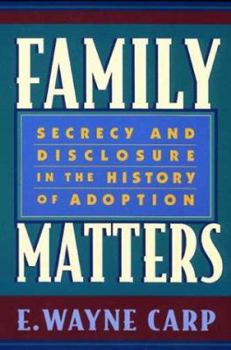Family Matters: Secrecy and Disclosure in the History of Adoption
Select Format
Select Condition 
Book Overview
This work looks at the history of adoption in American society and reveals how the practice and attitudes about it have evolved from colonial days to the 1990s. The author argues that it is ever more apparent that secrecy and disclosure are the defining issues in American adoptions. He discovers that openess used to be the norm before World War II and that this ceased due to a convergence of several unusual cultural, demographic, and social trends...
Format:Hardcover
Language:English
ISBN:0674796683
ISBN13:9780674796683
Release Date:April 1998
Publisher:Harvard University Press
Length:306 Pages
Weight:1.50 lbs.
Dimensions:1.1" x 6.4" x 9.6"
Related Subjects
20th Century Adoption Americas Health, Fitness & Dieting Health, Fitness & Dieting Historical Study & Educational Resources History Marriage & Family Mental Health Parenting & Relationships Politics & Social Sciences Psychology & Counseling Social History Social Science Social Sciences Social Work Sociology TextbooksCustomer Reviews
3 ratings
One of the best books on adoption
Published by Thriftbooks.com User , 23 years ago
I've read Carp's book very carefully and I can say without hesitation that it is one of a handful of the most important books on adoption published in the last 25 years. As the co-author of two editions of The Encyclopedia of Adoption (Facts on File) and the Executive Editor of three editions of Adoption Factbook, I have had the opportunity to become familiar with the full range of writing on adoption. Carp's book is outstanding.I say this despite some of the book's flaws -- some minor errors that might have been avoided if the author had interviewed one of the individuals he credits with being a major player during the last two decades, yours truly. I'm not sure that any such interview would have changed Carp's mind: he strikes me, in what he has written in this book and what he has said in public fora, as a typical academic -- stubbornly wedded to the facts he has unearthed. And facts he's unearthed are so critical to the history of adoption in this country that his book should be required reading in every school of social work, in every family law course and for every judge that ever hears an adoption case. His recitation of the history of the role played by the women in the U.S. Children's Bureau is worth the price of the book all by itself. His central contribution, however, is to say in much more detail what Alfred Kadushin said years earlier in his textbook, CHILD WELFARE. Like Kadushin, Carp finds no evidence to support the junk science that underlies most of what passes for "professional practice" in today's social work and related fields. If only Carp had written his work 20 years earlier, adoption of newborn infants in the U.S. today might well be still flourishing instead of hanging on by a thread. As the last two editions of Adoption Factbook pointed out, the number of pregnancies which end in adoption is about one out of every hundred. For some, such as the collection of cranks and quacks that make up the "Adoption Reform Movement," such a statistic is evidence of victory. But it is no victory for children or parents who are unwilling or unable to raise children. Perhaps Carp will turn his attention next to the most pernicious and deadly aspect of the "Adoption Reform Movement," the crew of self-anointed "counselors" who invent new psychiatric labels and then proceed to try to heal them. I speak here of those like the "rebirthing" therapists who smothered a girl to death. Such a book may take a psychiatrist with Carp's gift for research. In sum, Carp's book is a very good read. The only tragedy is that it has been so widely ignored, the victim of a planned campaign by those whose empty agenda is so clearly revealed by Carp's detective work.
Two books in one -- both tops!
Published by Thriftbooks.com User , 23 years ago
As a historian, I must compliment Professor Carp for his work on a topic that is seldom treated in a serious, academic fashion. His book is actually two chapters in the American adoption story. Chapter one tells us that the context of the times was such that adoption was never really favored, especially by social workers. That observation helps explain the current antipathy toward adoption by the inheritors of that bias. Chapter two debunks the "Adoption Reform Movement" in such a fashion that a sensible person would discard most of the books in most libraries based on the fallacies Carp describes. I'm not really into the various battles that seem to be raging in the adoption world but I applaud this incredible, sound piece of historical research. I know that historians who pick it up will be impressed. One can only hope that a few social workers will also read it.
It's a necessary read, and a necessary purchase.
Published by Thriftbooks.com User , 23 years ago
Carp has a lot of great information about adoption agencies' and social workers' policies concerning the release of birth and adoption information to adult adoptees. It was fascinating to see all the quotes regarding their acceptance of adoptees' desire for identifying information up until the 1950s or so.However, when it comes to information regarding the legislative histories of sealed birth and adoption records laws, he has little to contribute, and some of his information is wrong. Additionally, he seems to take it for granted that biological mothers in recent decades were promised absolute perpetual anonymity from their relinquished and subsequently adopted offspring, but this baseless assumption goes undocumented in his book (since it is, after all, an absolutely false assertion).That said (or rather, written), for those who want further insight into the issue of sealed versus open birth and adoption records, this book is not just a necessary read, but a necessary purchase.






